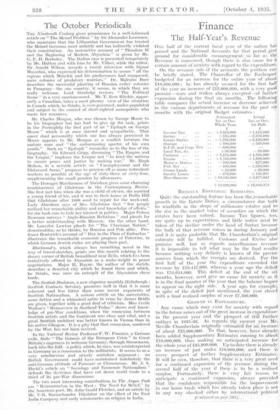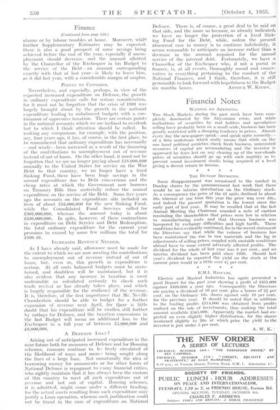Finance
The Half-Year's Revenue ,
ONE half of the current fiscal year of the nation Ibis passed and the National Accounts for that period.givp ground for' considerable eneoliragclaciit sc). :fax : as or • Revenue is concerned, though there is also cause for 6 certain amount of anxiety with regard to the expenditur4. • On the revenue. side of the accounts the position can be briefly stated. The Chancellor of the Exchequer. 'budgeted for an increase for the entire year of about £18,000,000,; he _ has already secured for the, first half 'of the year an increase of £13,000,000, with a ,very good promise—wars and strikes always excepted—Of further • :expansion during , the final six months. The . following table compares the actual increase or decrease achieved in the various departments' of revenue for the pastsi months with the original Budget estimates : Estimatod Inc. or Dee. Whole Year. • Actual Inc. or Dec. let Half.
Income Tax • +3,023,000
4-1,812,000
Surtax
+335,000 —2,670,000 Estate Duties ..
—1.356,000 +6,420,000 Stamps ..
-1- 890,000 +560,000 E.P.D. and Corp. Tax
• -600,000
Land Tax, &c'. .. • . +30,000 —20,000 Customs .. • • +3,474,000 +4,348,000 Excise • • +1,750,000 +1,600,000 Motor v. Duties .• • • —100,000 —327,000 Net .. • . —400,000
—1,550,000 Crown. Lands +10,000.
+20,000 Sundry Loans
—472,000 +146,231 Miscellaneous
+10,845,000 +2,677,642
+18,029;000 +13,016;873
REVENUE EXCEEDING ESTIMATES.
Quite the outstanding feature has been the.reinarkable growth in the Estate Duties, a circumstance due both to windfalls in the shape of millionaire estates and to the rise in the market value of securities on which the estates have been valued. Income Tax figures, too, are quite up to expectations and little notice need be taken of the &Cline under the head of Surtax because the bulk of that revenue comes in during January and and it is quite probable that Mr. Chamberlain's original estimate will be fulfilled. Customs and Excise als0 promise well, but as regards miscellaneous revenue it is impossible to tell what may be the final .resalt because nothing very definite is known of the precise? sources from which the receipts are derived. For th0 first half of the year the expenditure•.exceeded th0 revenue by £59,447,000, whereas a year ago the_defiel4 was £54,644,000. This deficit at the end of' the si months, however, need give no cause for • anxiety as is in the final quarter of the year that the balance beginS to appear on the right side. A year ago; for 'example; in spite of the deficit just mentioned, the year closei
I
With a final realised surplus of over £7;500,000. • • GROWTH IN EXPENDITURE.
• Any cause. which may exist for anxiety' with -regard to the future arises out of the:great increase in expenditure in the present year and the prospect, of Still further outlays in 1985-86: As regards; the, current year Mr. Neville Chamberlain originally estimated for an increase of __about E25,000,000. To that, hoWever, have already;. been added Supplemental*. BStimates running to abouti • £10,000,006; - thus making :an' anticipated increase foe the-whole yearof R85,000,000. Up to date there is already an increase • of just under t18,000;000; amid there is every prospect of further SupOementary kstinnates. It will be seen, therefore, that there is a very:great:need for a continued expansion ' of the revenue during the second half of the .year if there .is• '10 be , a 'realised' surplus. Fortunately, there is : very fair reason to • aijticipate a :continued' expansion? always provided that .the confiden6e responsible for .the, ;improvement
. • , •
our home trade which has already,taken place is not iu any •way checked' either by • internStiOnat•':pOlitical
• AN/zit:xi an .pci:* Aafj.lj
Finance (Continued from page 328.) alarms or by labour troubles at home. Moreover, • while further Supplementary Estimates may be expected, there is also a good prospect of some savings being achieved before the end of the year, especially if unem- ployment should decrease, and the amount allotted by the Chancellor, of the Exchequer in his Budget to the service of the Debt—an amount corresponding exactly with that of last year—is likely to leave him, as it did last year, with a considerable margin of surplus.
POINTS TO CONSIDER.
Nevertheless, and especially, perhaps, in view of the expected increased expenditure on Defence, the growth in ordinary expenditure calls for serious consideration, for it must not be forgotten that the crisis of 1931 was largely brought about by the growth in the national expenditure leading to unbalanced budgets with a con- tinuance of oppressive taxation. There are certain Points- in the national accounts which we are inclined to overlook but to which I think attention should be called. In making any comparison, for example, with the position, say, four years ago, it has, of course, in the first place, to be remembered that ordinary expenditure has necessarily —and wisely—been increased as a result of the financing of the contributions to unemployment out of revenue instead of out of loans. On the other hand, it must- not be forgotten that we are no longer paying about £18,000,000 annually to the United States for service on the War Debt to that country, we no 'longer have a fixed Sinking Fund, there have been huge savings in the annual expenditure due to Debt conversions and the cheap rates at which the Government now borrows on Treasury Bills thus materially reduce the annual expenditure on the service of the Debt. Some five years ago the accounts on the expenditure side included an item of about £55,000,000 for the new Sinking Fund, while the Consolidated Fund Services called for £302,000,000, whereas the amount today is about £286,000,000. In spite, however, of these contractions in expenditure- on Debt Service and Debt Redemption, the total ordinary expenditure for the current year' promises to exceed by. some few millions the total for 1930-81.
INCREASED REVENUE' NEEDED.
• As I have already said, allowance must be made for the extent to which we are now meeting the contributions to unemployment out of revenue instead of out of loans, but, even so, this growth in expenditure is serious. At all costs balanced budgets must be main- tained, and doubtless will be maintained, but it is also evident that any increase in taxation is most undesirable as calculated seriously to check such trade revival as has already taken place, and which is largely responsible for the resiliency of the revenue. It is, therefore, of the first importance that Mr. Neville Chamberlain should be able to budget for a further expansion of revenue next April, for there is little doubt that his expenditure will be swollen. still_ furtlier , by outlays for Defence, and the taxation concessions in the last Budget will mean an additional loss..to the Exchequer 'in a full year of between £5,000,000 and £6,000,000.
A DEFENCE LOAN?
'Arising out of anticipated increased expenditure in the near future both for measures of Defence and for Housing schemes, rumours continue to b freely circulated of the likelihood of ways and meaL,. being sought along the lines of a large loan. Not unnaturally the idea of borrowing money for armaments or for other forms of National Defence is repugnant to many financial critics, Who rightly maintain that it has always been the custom of this country to meet all such expenditure out of revenue and not out of capital. Housing schemes, it is, admitted, might come under a different heading, for the actual assets resulting from such expenditure may justify a Loan operation, whereas.such justification could not be found in the case of expenditure on National Defence. There is, of course, a great deal to be said on that side, and the more so because, as already indicated, we have no longer the protection of a fixed Sink- ing Fund for the Debt, while, unless the present abnormal ease in money is to continue indefinitely, it seems reasonable to anticipate an increase rather than a decrease in the amount required for the annual service of the internal debt. Fortunately, we have 'a Chancellor of the Exchequer who, if not a purist in finance, is, at all events, thoroughly sound and conser- vative in everything pertaining to the conduct of the National Finances, and I think, therefore, it is still permissible to look forward with hopefulness to the Budget.











































 Previous page
Previous page